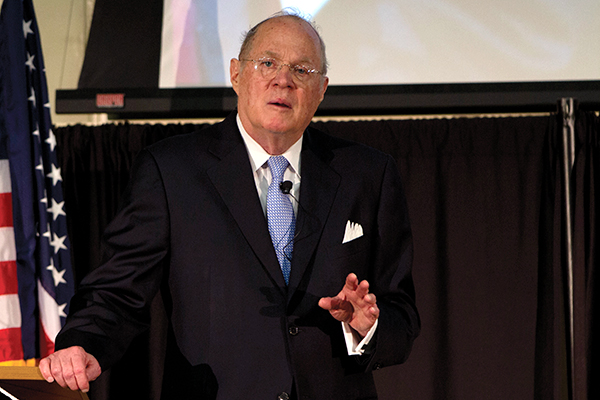
Supreme Court Associate Justice Anthony Kennedy discussed the functioning of the Supreme Court and his ideas about democracy in the legal system at the BankUnited Center Fieldhouse on Monday evening.
“The Constitution – big C Constitution – doesn’t belong to a bunch of judges and lawyers,” Kennedy told his audience. “It’s yours.”
Kennedy is the second Supreme Court justice to visit UM in the past two weeks – Associate Justice Sonia Sotomayor participated in a conversation with President Donna E. Shalala on Feb. 1.
While the Sotomayor event was held in conjunction with local bookstore Books & Books, Kennedy’s visit comes as part of the School of Law’s Robert B. Cole Distinguished Jurist Lecture Series.
Established in 1985, the Cole Lecture Series brings distinguished jurists and public figures to UM to discuss important legal matters. Eight other Supreme Court justices have participated in the past.
Kennedy talked about his experience on the Supreme Court and the duties that justices are faced with, such as deciding on which cases to see by reviewing thousands of petitions each year.
“Just like doing push-ups in the morning or something, every morning you read those petitions,” he said.
Kennedy compared writing opinions of the court to college assignments, which the justices do until the Court session ends for the summer.
“It’s as if you have five term papers, some of which haven’t even been assigned yet, that are due June 1,” he said.
Kennedy also explained the effort that goes into reading lengthy legal briefs before argument day.
“If they’re long briefs, I play operas,” he said. “I like opera in the background. I have one-opera briefs and two-opera briefs.”
Kennedy concluded his speech by emphasizing the importance of preserving and encouraging democracy through the law. The theory of democracy is that the current population acts as the trustees of freedom for the next generation, according to Kennedy.
“You’re trusted to hand down a democratic system to your children and grandchildren, your successors, that is stronger than the one you earned,” he said.
Therefore, Kennedy said that the public should be concerned about the lack of civic instruction in this generation and a lack of appreciation for America’s history.
“You can’t preserve what you haven’t studied,” he said. “You can’t protect what you cannot explain. You cannot defend what you do not know.”
After speaking for about 40 minutes, Kennedy opened the floor for a question-and-answer session, moderated by Patrick Gudridge, the vice dean of the School of Law. Law school students and undergraduates in Shalala’s health care policy course took turns asking questions.
One student asked about the extent to which the American public’s view of an issue affects the Supreme Court’s decision on a case.
“We decide issues that have political consequences,” Kennedy said. “We don’t decide them in a political way.”
First-year law student Rafael Yaniz said he was interested in hearing Kennedy speak because he has been the deciding vote in many Supreme Court cases.
“I thought it was a fascinating discussion, particularly in the beginning, where he gave his world view almost,” Yaniz said. “I was very interested in learning how he likes to approach a case and the way that he views the role of the judiciary.”
Yaniz said that Kennedy’s talk gave him valuable insight.
“I feel that I have a deeper understanding of his opinions now and, going forward, reading opinions that we’ve yet to cover, I’ll be able to understand it better,” he said.





